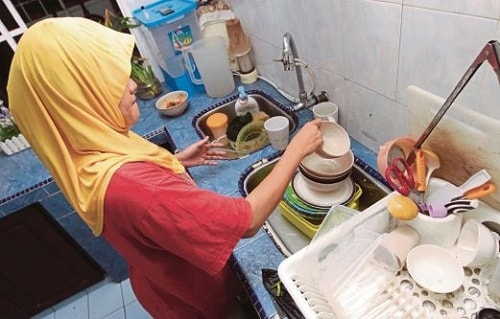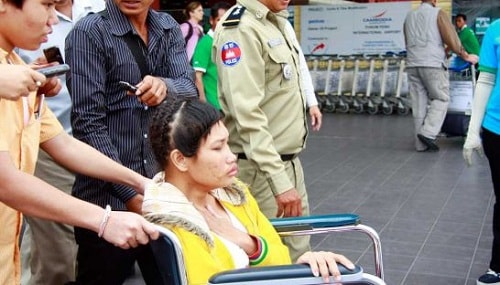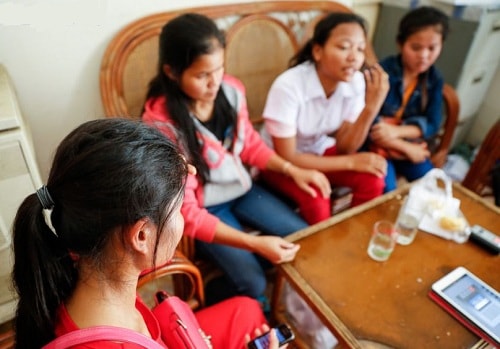Slave domestic work in Malaysia
Sok Nay can never forget the two painful weeks of asphalt burns after being punished by kneeling outside his employer's house after cleaning a chair incorrectly.
 |
A foreign maid in Malaysia. Photo: New Straits Times |
At that time, Sok Nay was working as a maid for a Chinese family in the suburbs of Sungai Buloh, Petaling district, Selangor state, Malaysia. The family was preparing to celebrate the 2009 Lunar New Year, according to Asian Correspondent.
"The chair was not broken, just wet. But she did not like it and got angry, punishing me by making me kneel in front of the door," the Cambodian girl who came to Malaysia to work as a maid recalled.
In 2011, the Cambodian government banned the sending of workers to Malaysia over safety concerns following a series of reports of abuse and murder. Three domestic workers were murdered by their employers, while two others were raped and held captive, with their passports confiscated.
It was not until December 2015, after the two governments signed a memorandum of understanding to "protect the rights of workers and laborers of the two countries", that Cambodia lifted the ban.
However, the previous ban has not stopped young girls from poor families in Cambodia from coming to Malaysia with the dream of finding high-paying jobs. They accept to stay in this country to work illegally.
Despite the memorandum of understanding, NGOs in Cambodia and Malaysia say that forced overtime without pay is still widespread. Employers confiscate passports to restrict workers’ freedom of movement and to enforce obedience. Worse, employers may starve or beat workers as punishment for misconduct.
"The most common type of abuse is beatings and verbal abuse. The most common type is forcing them to work long hours," said Ann Jacobs, director of the NSI program.
 |
A Cambodian domestic worker in Malaysia returned home in 2012 after being abused by her employer. Photo: Phnompenh Post |
NSI is a Kuala Lumpur-based NGO that helps migrant workers in Malaysia. Jacobs said they regularly hear from workers who say they work 18 hours a day, seven days a week, without breaks, and are starved.
"We once had a case where a worker who had committed a crime was beaten by her employer, starved, and forced to sleep outdoors. Eventually, she couldn't take it anymore and ran away, without any identification because her employer had kept her passport," Jacobs said.
"When they come to us, they don't even know the name of their employer, the address, the phone number, they don't know any information to get their passport back."
Work without pay
A house in the suburbs of Rawang, about a 40-minute drive north of the capital Kuala Lumpur, is where Nay spent her best six years as a maid.
The Cambodian girl first came to Malaysia to work as a maid in 2004.
"The landlord never hit me but often yelled at me. However, they dressed me well. Every day, I got up at 4:30 to clean. It was a big villa. There were days when I didn't go to bed until 0:30," Nay recalls.
She stayed there for four years, cleaning the nine-bedroom mansion, washing cars, bathing dogs, cooking and taking care of the family's children.
According to Jacobs, normally, domestic workers in Malaysia are only required to do one task when hired, either cleaning the house or being a nanny, but never both.
"That family has two children, one of whom is special. He doesn't know how to communicate, he doesn't know how to talk, I don't know how to talk to him so taking care of him is very difficult," Nay explained.
Now she has not had a day off in 4 years of work, but has not been paid any extra money. Her passport has also been kept by her employer, and her salary has been deducted.
"I had 6.5 months of salary deducted. I don't know why, they just deducted it. I applied to go to Malaysia and they promised to take care of everything. So I assumed they would deduct the cost from my salary," Nay said.
"When it was time to get paid, they put everything in an envelope, all in US dollars. I went home and gave all the money to my parents, about 5,500 USD," she said. Although she was promised a salary of 400 USD a month, Nay was only paid 114 USD.
An anonymous employee of the Cambodian NGO Chab Dai said many Cambodian women were lured to work in Malaysia with promises of high salaries and good treatment, but the reality was far from it.
"They were deceived from the beginning, the broker always promised to earn 200-300 USD a month and get insurance, work 6 days a week, food allowance. However, when they arrived, they realized there was no free lunch. They did not get paid and if they were sick, they still had to work. They were deceived," this person said.
Workers are abused when they have to pay all the expenses to Malaysia that the broker has advanced, forcing them to work without pay for at least the first 6 months, sometimes a whole year.
"I just want to go home"
Nay was abused, starved, overworked and isolated for nearly two years while working as a domestic helper for a family in Sungai Buloh, until she was hospitalised due to exhaustion.
"In addition to cleaning the house, washing the car, and taking care of their children, the landlord also forced me to work in a curtain factory. One day, I ruined an expensive piece of fabric. The landlady was very angry and forced me to clean the whole house by myself without giving me anything to eat. Then she beat me with a stick. I fainted from hunger," Nay recalls.
At the hospital, nurses questioned her after noticing bruises on her body. They called the police to report abuse.
"The police said that if I filed a complaint, my employer would be arrested, but at that time I didn't know anyone and just wanted to quickly get all my salary and go home," she said. "If I filed a complaint, would they help me? They could put my employer in jail, but I didn't care, I just wanted to go home to see my parents."
 |
Cambodian domestic workers repatriated from Malaysia talk with NGO officials. Photo: Phnompenh Post |
Nay's case is all too common, according to NGOs that help Cambodian domestic workers.
"The police's working process is very slow and lengthy; and the workers do not want to report, they just want to go home and continue their lives," said Irene Xavier, a representative of a Malaysian non-governmental organization.
According to Cambodia’s Ministry of Foreign Affairs, 272 workers returned home in 2016, four times more than in 2015. In 2014, only 34 returned to Cambodia. The main reasons for repatriation were human trafficking, overwork and abuse, according to Cambodia’s Ministry of Health.
Heng Sour, a spokesman for the Cambodian Ministry of Labor, stressed that since the temporary ban on labor exports was issued in 2011, no Cambodian domestic workers have been sent to Malaysia legally. Sour explained that so far, no workers have gone to Malaysia because the two governments are working to open vocational training centers, develop curricula and training standards.
Malaysia's Home Ministry said the memorandum of understanding signed in 2015 has not yet come into effect.
 |
Malaysian Deputy Home Minister Nur Jazlan Mohamed. Photo: Asian Correspondent. |
When asked about protecting illegal domestic workers in Malaysia, as well as victims of human trafficking or abusive employers who have fled, Mr. Sour said it was difficult to protect them.
"They are still considered illegal workers, so we do not encourage them to go to Malaysia on their own. We will try to educate and train domestic workers, warning them that working illegally will be very difficult. That is why we constantly advise people to export workers through legal channels. Otherwise, it will be difficult to protect them," he said.
Malaysian Deputy Home Minister Nur Jazlan Mohamed also agreed with the above opinion. He said that domestic workers need to come to Malaysia through legal channels, recognized by the government.
"We have laws to protect them if they are abused. If they don't report it, it will be very difficult for us to protect them. Law enforcement can't go into every house, so workers have to be proactive."
According to VNE
| RELATED NEWS |
|---|








